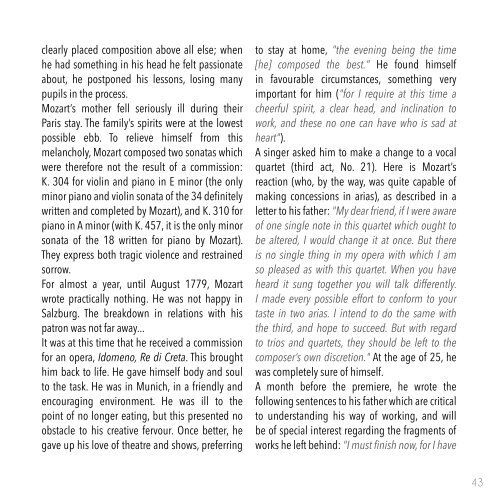Livret-Mozart-Levin-Poulet-La-Goillotte-Le-Palais-des-D%C3%A9gusteurs
Livret-Mozart-Levin-Poulet-La-Goillotte-Le-Palais-des-D%C3%A9gusteurs
Livret-Mozart-Levin-Poulet-La-Goillotte-Le-Palais-des-D%C3%A9gusteurs
You also want an ePaper? Increase the reach of your titles
YUMPU automatically turns print PDFs into web optimized ePapers that Google loves.
clearly placed composition above all else; when<br />
he had something in his head he felt passionate<br />
about, he postponed his lessons, losing many<br />
pupils in the process.<br />
<strong>Mozart</strong>’s mother fell seriously ill during their<br />
Paris stay. The family’s spirits were at the lowest<br />
possible ebb. To relieve himself from this<br />
melancholy, <strong>Mozart</strong> composed two sonatas which<br />
were therefore not the result of a commission:<br />
K. 304 for violin and piano in E minor (the only<br />
minor piano and violin sonata of the 34 definitely<br />
written and completed by <strong>Mozart</strong>), and K. 310 for<br />
piano in A minor (with K. 457, it is the only minor<br />
sonata of the 18 written for piano by <strong>Mozart</strong>).<br />
They express both tragic violence and restrained<br />
sorrow.<br />
For almost a year, until August 1779, <strong>Mozart</strong><br />
wrote practically nothing. He was not happy in<br />
Salzburg. The breakdown in relations with his<br />
patron was not far away...<br />
It was at this time that he received a commission<br />
for an opera, Idomeno, Re di Creta. This brought<br />
him back to life. He gave himself body and soul<br />
to the task. He was in Munich, in a friendly and<br />
encouraging environment. He was ill to the<br />
point of no longer eating, but this presented no<br />
obstacle to his creative fervour. Once better, he<br />
gave up his love of theatre and shows, preferring<br />
to stay at home, "the evening being the time<br />
[he] composed the best." He found himself<br />
in favourable circumstances, something very<br />
important for him ("for I require at this time a<br />
cheerful spirit, a clear head, and inclination to<br />
work, and these no one can have who is sad at<br />
heart").<br />
A singer asked him to make a change to a vocal<br />
quartet (third act, No. 21). Here is <strong>Mozart</strong>’s<br />
reaction (who, by the way, was quite capable of<br />
making concessions in arias), as <strong>des</strong>cribed in a<br />
letter to his father: "My dear friend, if I were aware<br />
of one single note in this quartet which ought to<br />
be altered, I would change it at once. But there<br />
is no single thing in my opera with which I am<br />
so pleased as with this quartet. When you have<br />
heard it sung together you will talk differently.<br />
I made every possible effort to conform to your<br />
taste in two arias. I intend to do the same with<br />
the third, and hope to succeed. But with regard<br />
to trios and quartets, they should be left to the<br />
composer’s own discretion." At the age of 25, he<br />
was completely sure of himself.<br />
A month before the premiere, he wrote the<br />
following sentences to his father which are critical<br />
to understanding his way of working, and will<br />
be of special interest regarding the fragments of<br />
works he left behind: "I must finish now, for I have<br />
43


